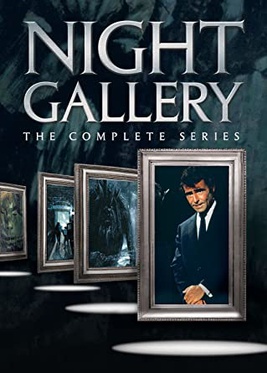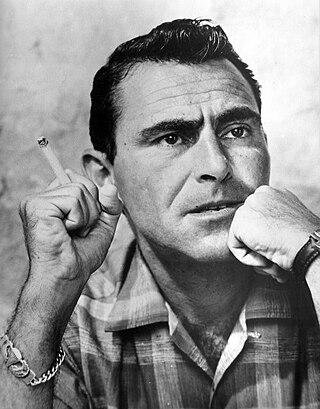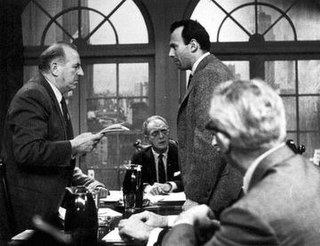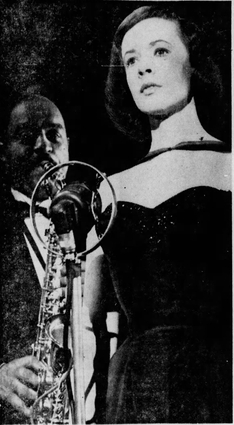
Night Gallery is an American anthology television series that aired on NBC from December 16, 1970, to May 27, 1973, featuring stories of horror and the macabre. Rod Serling, who had gained fame from an earlier series, The Twilight Zone, served both as the on-air host of Night Gallery and as a major contributor of scripts, although he did not have the same control of content and tone as he had on The Twilight Zone. Serling viewed Night Gallery as a logical extension of The Twilight Zone, but while both series shared an interest in thought-provoking dark fantasy, more of Zone's offerings were science fiction while Night Gallery focused on horrors of the supernatural.

Rodman Edward Serling was an American screenwriter and television producer best known for his live television dramas of the 1950s and his anthology television series The Twilight Zone. Serling was active in politics, both on and off the screen, and helped form television industry standards. He was known as the "angry young man" of Hollywood, clashing with television executives and sponsors over a wide range of issues, including censorship, racism, and war.
The year 1959 in television involved some significant events. Below is a list of television-related events during 1959.

Bob Hope Presents the Chrysler Theatre is an American anthology series, sponsored by Chrysler Corporation, which ran on NBC from 1963 through 1967. The show was hosted by Bob Hope, but it had a variety of formats, including musical, dramatic, and comedy.

Robert Martin Culp was an American actor and screenwriter widely known for his work in television. Culp earned an international reputation for his role as Kelly Robinson on I Spy (1965–1968), the espionage television series in which he and co-star Bill Cosby played secret agents. Before this, he starred in the CBS/Four Star Western series Trackdown as Texas Ranger Hoby Gilman in 71 episodes from 1957 to 1959. The 1980s brought him back to television as FBI Agent Bill Maxwell on The Greatest American Hero. Later, he had a recurring role as Warren Whelan on Everybody Loves Raymond, and was a voice actor for various computer games, including Half-Life 2. Culp gave hundreds of performances in a career spanning more than 50 years.

Sally Clare Kellerman was an American actress whose acting career spanned 60 years. Her role as Major Margaret "Hot Lips" Houlihan in Robert Altman's film M*A*S*H (1970) earned her an Academy Award nomination for Best Actress in a Supporting Role. After M*A*S*H, she appeared in a number of the director's projects, namely the films Brewster McCloud (1970), Welcome to L.A. (1976), The Player (1992), and Prêt-à-Porter (1994), and the short-lived anthology TV series Gun (1997). In addition to her work with Altman, Kellerman appeared in films such as Last of the Red Hot Lovers (1972), Back to School (1986), plus many television series such as The Twilight Zone (1963), The Outer Limits, Star Trek (1966), Bonanza, The Minor Accomplishments of Jackie Woodman (2006), 90210 (2008), Chemistry (2011), and Maron (2013). She also voiced Miss Finch in Sesame Street Presents: Follow That Bird (1985), which went on to become one of her most significant voice roles.

Kraft Television Theatre is an American anthology drama television series running from 1947 to 1958. It began May 7, 1947 on NBC, airing at 7:30 p.m. on Wednesday evenings until December of that year. It first promoted MacLaren's Imperial Cheese, which was advertised nowhere else. In January 1948, it moved to 9 p.m. on Wednesdays, continuing in that timeslot until 1958. Initially produced by the J. Walter Thompson advertising agency, the live hour-long series offered television plays with new stories and new characters each week, in addition to adaptations of such classics as A Christmas Carol and Alice in Wonderland. The program was broadcast live from Studio 8-H at 30 Rockefeller Plaza, currently the home of Saturday Night Live.

The Kraft Suspense Theatre is an American television anthology series that was produced and broadcast from 1963 to 1965 on NBC. Sponsored by Kraft Foods, it was seen three weeks out of every four and was pre-empted for Perry Como's Kraft Music Hall specials once monthly. Como's production company, Roncom Films, also produced Kraft Suspense Theatre.. Writer, editor, critic, and radio playwright Anthony Boucher served as consultant on the series.
Martine Bartlett was an American actress. A life member of The Actors Studio, Bartlett is best-remembered, albeit not by name, for her chilling performance as Hattie Dorsett, the seriously disturbed, abusive mother of Sally Field's title character in Sybil.
"The Comedian" is a 1957 live television drama written by Rod Serling from a novella by Ernest Lehman, directed by John Frankenheimer, and starring Mickey Rooney, Edmond O'Brien, Kim Hunter, Mel Tormé and Constance Ford.

"Patterns" was an American television play broadcast live on January 12, 1955, as part of the NBC television series, Kraft Television Theatre. Because of its popularity, it was restaged on February 9, 1955.
Sam Locke was an American writer and director who worked in theatre, television, and film.

The Wisconsin Center for Film and Theater Research (WCFTR) is a major archive of motion picture, television, radio, and theater research materials. Located in the headquarters building of the Wisconsin Historical Society in Madison, Wisconsin, the WCFTR holds over three hundred collections from motion picture, television, and theater writers, producers, actors, designers, directors, and production companies. These collections include business records, personal papers, scripts, photographs, promotional graphics, and some twenty thousand films and videotapes of motion picture and television productions.
Burton Miller was an American costume designer. He was perhaps best known for his work on the TV shows The Six Million Dollar Man and Alfred Hitchcock Presents. He tended to work on TV.

"A Town Has Turned to Dust" is an American television play broadcast live on June 19, 1958, as part of the second season of the CBS television series Playhouse 90. Rod Serling wrote the teleplay, and John Frankenheimer directed. Rod Steiger and William Shatner starred.

"Something About Lee Wiley" was an American television episode broadcast by NBC on October 11, 1963, as part of the television series, Bob Hope Presents the Chrysler Theatre. The film told the story of jazz singer Lee Wiley. Piper Laurie played the role of Wiley.

"War of Nerves" was an American television film broadcast by NBC on January 3, 1964, as part of the television series, Bob Hope Presents the Chrysler Theatre.

"The Strike" was an American television play broadcast on June 7, 1954, as part of the CBS television series Westinghouse Studio One. Written by Rod Serling and directed by Franklin J. Schaffner, the drama is set during the darkest period of the Korean War, focusing on the stress of command in sacrificing troops in combat. The running time was 59:21, including breaks hosted by Betty Furness, promoting Westinghouse refrigerators, stoves, room air conditioners, and dehumidifiers.












